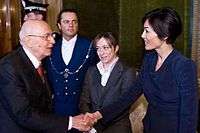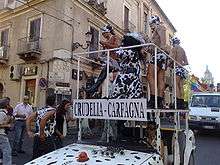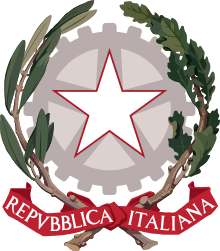Mara Carfagna
Maria Rosaria "Mara" Carfagna (born 18 December 1975) is an Italian politician and former showgirl and model. After obtaining a degree in law,[1] Carfagna worked for several years on Italian television shows and as a model. She later entered politics and was elected to the Chamber of Deputies for Forza Italia party in 2006. From 2008 to 2011 she served as Minister for Equal Opportunity in Berlusconi IV Cabinet.
Maria Rosaria Carfagna | |
|---|---|
 | |
| Minister for Equal Opportunities | |
| In office 8 May 2008 – 16 November 2011 | |
| Prime Minister | Silvio Berlusconi |
| Preceded by | Barbara Pollastrini |
| Succeeded by | Elsa Fornero |
| Member of the Chamber of Deputies | |
| Assumed office 28 April 2006 | |
| Constituency | Campania 2 |
| Vice President of the Chamber of Deputies | |
| Assumed office 29 March 2018 | |
| President | Roberto Fico |
| Personal details | |
| Born | 18 December 1975 Salerno, Italy |
| Nationality | Italian |
| Political party | Forza Italia (2013–present) |
| Other political affiliations | The People of Freedom (2009–2013) Forza Italia[lower-alpha 1] (2004–2009) |
| Domestic partner | Alessandro Ruben (2013–present) |
| Alma mater | University of Salerno |
Carfagna had been named "the most beautiful minister in the world",[2][3] and was ranked number one on Maxim's "World's Hottest Politicians".[4] She's spokeswoman of the parliamentary group of Forza Italia at Chamber of Deputies.
Early life
Carfagna was born in Salerno, where she attended the Liceo scientifico Giovanni da Procida.[5] In 2001 she graduated in law from the University of Salerno, with a thesis on information law and broadcasting systems.[5]
Career as showgirl and model
After having studied dance and piano, she participated in the Miss Italy contest in 1997, finishing in sixth place.[5] About the experience she later said: "That competition makes you as a woman, it matures you...all that stress, that desire to win, it makes you understand who you are."[6]
Later she started working in television for the company Mediaset, controlled by the family of Silvio Berlusconi. From 2000 to 2006 she participated as a showgirl in the television program La domenica del villaggio ("Sunday in the Village") with Davide Mengacci. In 2006 she led the program Piazza grande ("Main Square") together with Giancarlo Magalli.[7] Carfagna has also been part of the television programs I cervelloni, Vota la voce and Domenica in.[8]
Mara Carfagna has posed for Maxim calendar.[9] She states that she is a firm believer in family values, and claimed in an interview that she once refused to take part in a movie directed by erotic filmmaker Tinto Brass, when she was twenty years old.[10]
Political career
2000s: Forza Italia and The People of Freedom

Carfagna entered politics in 2004, and became responsible for the women's movement in the political party Forza Italia.[5][11] In the elections of 2006 she was elected into the Chamber of Deputies for Forza Italia, and in the 2008 elections – running as the third candidate from The People of Freedom in the district "Campania 2" – she was reelected.[12] When she first entered parliament Berlusconi jokingly commented that Forza Italia practiced the law of primae noctis; the right of a feudal lord to take the virginity of his female subjects.[13] As a deputy she was secretary of the Commission for Constitutional Affairs,[5] and has been described as a diligent, hard-working parliamentarian.[14] On 8 May 2008 she was appointed Minister for Equal Opportunity,[15] in the fourth cabinet of Silvio Berlusconi, an appointment that was widely publicised internationally, with focus on her special background.[2][6][16]
In September 2008, Carfagna introduced proposal for a new law making street prostitution a crime, with fines for both clients and prostitutes. The bill was her first major initiative as a minister. She said that at present in Italy, "as in the great majority of Western countries", brothels and the exploitation of prostitutes by pimps were illegal but prostitution as such was not. She described street prostitution as a "shameful phenomenon".[17]
In 2009 she became the first political promoter of the law against stalking offence. This law was finally approved on 23 February 2009, introduced as a package of bills known as the Decreto Maroni. In the same year she signed a campaign against homophobia in Italy, with television spots, images on magazines and wall attachments on cities.[18]
She has participated in many international conferences, met the UN Secretary General, has intervened four times to the General Assembly, where she promoted an international moratorium against FGM. She organized the first international conference on violence against women in the context of the G8, which was held in the city of L'Aquila, in Italy, in July 2009.[19]
2010s: Forza Italia revival

In 2010 during political debate for the International Women's Day celebration Mara made a political gaffe, claiming that women gained the right to vote in Italy in 1960 (while they did in 1946) and that the law that rules intrahousehold relationship was reformed in 1970 (while it was in 1975).[20] In the 2010 Campania regional election Mara Carfagna had a record result of 55,695 preferences.[21] In 2011, Mara proposed a law, which was passed, that provided quotas for women on the boards of companies, which has allowed to involve a larger number of women in the Italian economic system. It approved funding for childcare facilities and in support of motherhood and family that made it possible to increase by a few percentage points the availability of places for working mothers.[22] That same year Carfagna also supported a bill against homophobia, in which homophobia was considered as an aggravating circumstance in bullying events. This bill was then rejected by the People of Freedom majority in the Parliament, causing Carfagna's disappointment.[23]
In 2013, Silvio Berlusconi founded Forza Italia, an ideological revival of the eponymous party that existed in the 1994–2009 period.[24] Mara joined the party, following Berlusconi. In the same year she began a relationship with ex–deputy Alessandro Ruben.[25] In the 2016 Italian local elections, Carfagna was the most voted Forza Italia candidate in Naples, with more than 5,500 personal preferences.[26]
In November 2018, on the occasion of the International Day for the Elimination of Violence against Women, Mara Carfagna launched a campaign called "Non è normale che sia normale" ("It's not normal that it's normal") involving many parliamentarians of all political parties, VIPs and personalities of sport and entertainment.[27]
In August 2019, the Codice Rosso ("Red Code") legislation, proposed by Carfagna, enters into force in Italy to combat violence against women with more efficient investigations and more severe penalties.[28]
Political views and controversies

Carfagna has been vocal on certain issues, such as the level of crime in her home town of Salerno, after having herself been the victim of burglary on three occasions.[29]
In 2007 Mara opposed gay marriage, and said that matrimonial rights should be tied to reproduction.[30] In May 2008 she refused to back a gay pride march, arguing that discrimination was no longer a problem for homosexuals in Italy because homophobia was just a thinking offence, a statement that was strongly criticized by gay rights groups.[31] In May 2010, during the Quirinal Palace ceremony on the occasion of International Day Against Homophobia, Transphobia and Biphobia, Carfagna publicly apologized for the statements she made two years earlier, saying "she was helped in breaking through the wall of mistrust of which she was at the same time victim and unconscious responsible".[32]
In January 2007, Carfagna was at the center of a controversy that received international attention. On the evening of the Telegatto award show, Berlusconi said about Carfagna: "If I was not already married I would have married her immediately". The comment caused Berlusconi's wife, Veronica Lario, to demand an apology through a national newspaper, something which she also received.[6] Carfagna herself has later described the comment as "gallant and harmless," and said that she did not quite understand Lario's reaction.[33]
On 2 July 2008 the Italian newspaper la Repubblica interviewed the former vice-minister of Foreign Affairs in the Berlusconi II Cabinet and socialist executive Margherita Boniver, who admitted the existence of some compromising private phone calls about Berlusconi.[34] Few days later, the Argentine journal Clarín reported about telephone wiretap records authorized for an anti-corruption investigation. Reporter Julio Algañaraz wrote that Carfagna and Silvio Berlusconi engaged in a telephone conversation with explicit sexual allusions and regarding a meeting about sexual services.[35]
In November 2008 Italian journalist Paolo Guzzanti wrote on his blog about Carfagna, saying: "Is it admissible or ineligible, in a hypothetical democracy, that the head of a government nominate a minister who has the one and only merit of having him personally served, excited and satisfied?"[36], thus highlighting the words spoken by his daughter Sabina Guzzanti at "No Cav Day" anti-Berlusconi protest movement in July 2008.[37] Carfagna sued la Repubblica for having reported Sabina Guzzanti's words that alluded to her sexual activity with Berlusconi.[38]
In October 2012 the "Civil Court of Rome" condemned Sabina Guzzanti to compensation of €40,000 to Carfagna.[39][40]
On June 25, 2020, Mara Carfagna, as vice president of the Chamber of Deputies, ordered the forced expulsion of the Hon. Vittorio Sgarbi who, pronouncing himself on the decree amending the law containing urgent measures concerning criminally relevant wiretapping, pronounced the following: "If a criminal commits a crime is normal, but if a Judge does it, it's an institutional earthquake. After the declarations without precedents against you coming from a Judge of Superior Council, after the unprecedented statements of Palamara against Mr. Salvini, we must open a commission of inquiry against the crime of magistrates who do the opposite of their work, worse than criminals" . This source in italian is : «Che un criminale delinqua è normale, che lo faccia un magistrato è un terremoto istituzionale. Dopo le inaudite dichiarazioni contro di lei di un magistrato del Csm -ha affermato Sgarbi rivolgendosi al ministro della Giustizia, Alfonso Bonafede-dopo le inaudite dichiarazioni di Palamara contro l’onorevole Salvini, dobbiamo aprire una commissione di inchiesta contro la criminalità di magistrati che fanno l’opposto del loro lavoro, peggio dei criminali" ( source Ildubbio.news ).
Notes
- Forza Italia first incarnation (1994–2009).
References
- "Berlusconi blitzes back to power with old friends and a showgirl". Irish Independent. 9 May 2008. Retrieved 20 February 2020.
- "Berlusconi hat die schönste Ministerin der Welt" [Berlusconi has the most beautiful minister in the world]. Bild (in German). 9 May 2008. Archived from the original on 4 December 2008. Retrieved 20 February 2020.
- Veronese, Massimo M. (9 May 2008). "Mara Carfagna? È il ministro più bello del mondo" [«Mara Carfagna? She's the most beautiful minister in the world»]. Il Giornale (in Italian). Retrieved 20 February 2020.
- "The World's Hottest Politicians". Maxim's. Archived from the original on 8 May 2014. Retrieved 20 February 2020.
1. Mara Carfagna, Italy
- Carfagna, Mara. "Mara Carfagna – Chi Sono" [Mara Carfagna – Whom I Am]. Mara Carfagna (in Italian). Archived from the original on 12 October 2008. Retrieved 20 February 2020.
- Pisa, Nick (9 May 2008). "Mara Carfagna is Italy's sexiest minister". The Daily Telegraph (Sydney). Archived from the original on 12 May 2008. Retrieved 20 February 2020.
- "Mara Carfagna, pasionaria azzurra" [Mara Carfagna, blue pasionaria] (in Italian). 31 January 2007. Retrieved 20 February 2020.
- "Mara Carfagna". Excite.it (in Italian). 30 April 2004. Archived from the original on 10 May 2008. Retrieved 20 February 2020.
- "I peccati dell'estate" [Summer's sins]. Maxim (in Italian). Retrieved 20 February 2020.
- "Rubino,Fiorella all'occhiello di FI" [Rubino, flagship of FI] (in Italian). 9 March 2006. Archived from the original on 8 June 2006. Retrieved 20 February 2020.
- "Silvio premia Mara: veleni rosa in Fi" [Silvio rewards Mara: pink venoms in Fi]. La Stampa (in Italian). 20 October 2007. Archived from the original on 22 October 2007. Retrieved 20 February 2020.
- "Quote rosa, lite Carfagna-Prestigiacomo" [Pink quotas, Carfagna-Prestigiacomo quarrel]. Corriere della Sera (in Italian). 31 May 2006. Retrieved 20 February 2020.
- Owen, Richard (21 May 2008). "Mara Carfagna: showing her slip". The Times. Archived from the original on 7 May 2009. Retrieved 20 February 2020.
- Ceccarelli, Filippo (9 May 2008). "Tendenza Carfagna" [Carfagna tendency]. la Repubblica (in Italian). Retrieved 20 February 2020.
- "I Ministri del Governo Berlusconi IV" [Ministers of Berlusconi IV Cabinet]. Government of Italy (in Italian). Archived from the original on 11 May 2008. Retrieved 20 February 2020.
- Moore, Malcolm (7 May 2008). "Berlusconi appoints former showgirl to cabinet". The Daily Telegraph. Retrieved 20 February 2020.
- "Mara Carfagna: "L'Italia non sarà più terra di conquista per chi sfrutta le donne"" [Mara Carfagna: "Italy no longer be a land of conquest for those who exploit women"]. Il Giornale (in Italian). 14 September 2008. Retrieved 20 February 2020.
- "Il ministro Carfagna lancia la campagna contro l'omofobia" [Minister Carfagna launches the campaign against homophobia]. Panorama (in Italian). 10 November 2009. Archived from the original on 28 March 2010. Retrieved 20 February 2020.
- "Lo stupro è contro i diritti umani" ["Rape is against human rights"]. Il Giornale (in Italian). 8 September 2009. Retrieved 20 February 2020.
- "Punto di vista" [Point of view]. TG2 (in Italian). 2010. Rai 2.
- "Protagonisti tre candidati alla prova delle amministrative" [Three candidates protagonists of the administrative test]. Corriere della Sera (in Italian). 31 March 2010. Archived from the original on 20 November 2015. Retrieved 20 February 2020.
- "Quote rosa nei cda sono legge. Carfagna: "Decisione storica"" [Pink quotas on the boards are law. Carfagna: "Historical decision"]. Il Fatto Quotidiano (in Italian). 28 June 2011. Retrieved 20 February 2020.
- "Omofobia, bocciato il testo del Pd. Insorge la Carfagna: "Voterò a favore"" [Homophobia, Democratic Party's bill rejected. Carfagna rises: "I will vote in favor"]. la Repubblica (in Italian). 18 May 2011. Retrieved 20 February 2020.
- "Pdl, Berlusconi cancella il Pdl e rifonda Forza Italia. Senza Alfano" [People of Freedom, Berlusconi cancels the PoF and re-establishes Forza Italia. Without Alfano]. Il Fatto Quotidiano (in Italian). 25 October 2013. Retrieved 20 February 2020.
- "Un nuovo amore per Mara Carfagna: è Alessandro Ruben" [New love for Mara Carfagna: Alessandro Ruben]. la Repubblica (in Italian). 18 October 2013. Retrieved 20 February 2020.
- "Elezioni comunali 2016, candidati e preferenze: dal boom di Maria Stella Gelmini al flop di Simona Tagli ( e degli altri vip)" [2016 local elections, candidates and preferences: from Maria Stella Gelmini's boom to Simona Tagli's flop (and other VIPs)]. Corriere della Sera (in Italian). 6 June 2016. Retrieved 20 February 2020.
- "Non è normale che sia normale, Mara Carfagna sostiene la campagna contro la violenza sulle donne" [It's not normal that it's normal, Mara Carfagna supports campaign against violence on women]. Il Messaggero (in Italian). 21 November 2018. Retrieved 20 February 2020.
- "Entra in vigore il Codice Rosso, Carfagna: «Serve 1 miliardo di euro per le forze dell'ordine»" [Red Code enters into force, Carfagna: «We need 1 billion euros for law enforcement»]. Il Messaggero (in Italian). 8 August 2019. Retrieved 20 February 2020.
- Giannattasio, Gianni (19 November 2007). "Salerno, Mara Carfagna lancia l'allarme: "Ho subito tre furti, altro che città sicura"" [Salerno, Mara Carfagna raises the alarm "I suffered three thefts, it's nothing like a safe city"]. La Città di Salerno (in Italian). Archived from the original on 26 November 2007. Retrieved 20 February 2020.
- Signore, Adalberto (31 January 2007). "«Gli italiani non-vogliono questi finti matrimoni»" [«Italians don't want these fake marriages»]. Il Giornale (in Italian). Retrieved 20 February 2020.
- "Italian equal opportunities minister rejects 'gay pride' march". International Herald Tribune. 19 May 2008. Archived from the original on 21 May 2008. Retrieved 20 February 2020.
- "La Carfagna si scusa con il mondo gay: grazie alla Concia ho superato diffidenze" [Carfagna apologizes to the gay world: thanks to [Paola] Concia I have overcome mistrust]. Corriere della Sera (in Italian). 18 May 2010. Retrieved 20 February 2020.
- Perna, Giancarlo (28 January 2008). "Carfagna: nella politica ho la stessa disciplina che dedicavo alla danza" [Carfagna: in politics I have the same discipline I devoted to dance]. Il Giornale (in Italian). Retrieved 20 February 2020.
- Carmelo Lopapa (2 July 2008). "'Le telefonate stanno per uscire'. Alla Camera incubo Grande Fratello" ["Those phone calls are about to come out". The Big Brother nightmare in the Chamber]. la Repubblica (in Italian). Retrieved 20 February 2020.
- Clarín (ed.). "Sexgate a la italiana: el escándalo salpica a Berlusconi y una ministra" [Italian sexgate: the scandal splashes on Berlusconi and a woman minister] (in Spanish). Retrieved 20 February 2020.
- Paolo Guzzanti (2 November 2008). "NON PARLIAMO DELLA SIGNORINA MARA CARFAGNA, CALENDARISTA DALLE PARI OPPORTUNITA', MA…" [LET'S NOT TALK ABOUT LADY MARA CARFAGNA, CALENDARIST OF EQUAL OPPORTUNITIES, BUT ABOUT...]. PaoloGuzzanti.it (in Italian). Archived from the original on 6 November 2008. Retrieved 20 February 2020.
- "La Guzzanti insulta la Carfagna: "E' uno sfregio che sia ministro"" [Guzzanti insults Carfagna: "It's a disfigurement that she's a minister"]. la Repubblica (in Italian). 8 July 2008. Retrieved 20 February 2020.
- "La Carfagna querela Repubblica. "Ha riportato frasi ingiuriose della Guzzanti"" [Carfagna sues la Repubblica. "It reported Guzzanti's insulting words"]. la Repubblica (in Italian). 25 September 2009. Retrieved 20 February 2020.
- "Sabina Guzzanti diffamò la Carfagna: Dovrà risarcirla con 40mila euro" [Sabina Guzzanti defamed Carfagna: she will have to compensate with €40,000]. Il Giornale. 9 October 2012. Retrieved 20 February 2020.
- "Sabina Guzzanti dovrà pagare 40mila euro a Mara Carfagna per diffamazione" [Sabina Guzzanti will have to pay €40,000 to Mara Carfagna because defamation]. Il Sole 24 Ore. 9 October 2012. Retrieved 20 February 2020.
External links
| Wikimedia Commons has media related to Mara Carfagna. |
- Ministry biography
- Personal blog
- Mara Carfagna – slideshow and video by The Huffington Post
| Political offices | ||
|---|---|---|
| Preceded by Barbara Pollastrini |
Italian Minister of Equal Opportunities 2008–2011 |
Succeeded by Elsa Fornero |
| Italian Chamber of Deputies | ||
| Preceded by Title jointly held |
Member of the Italian Chamber of Deputies Legislatures XV, XVI, XVII, XVIII 2006–present |
Incumbent |
